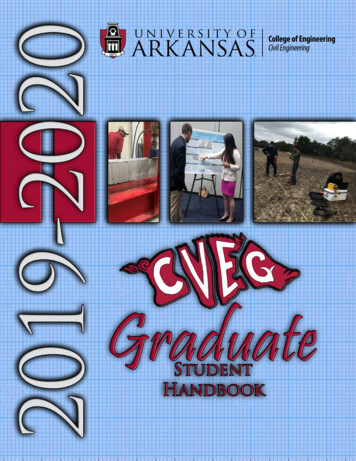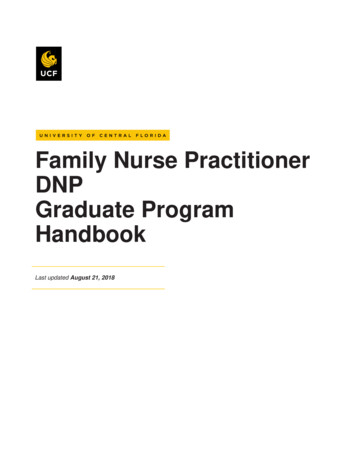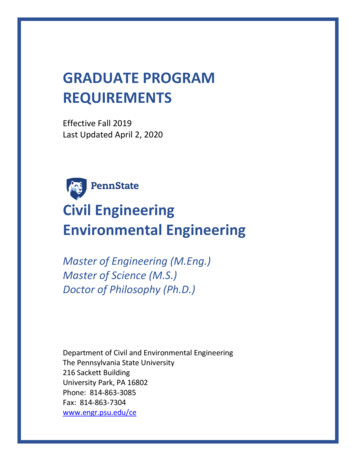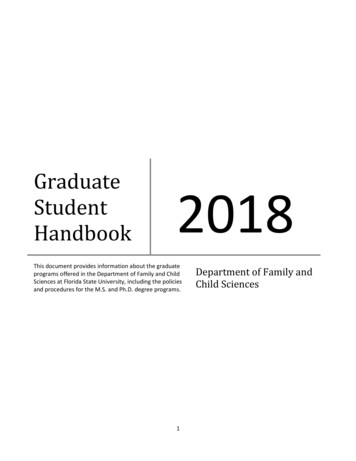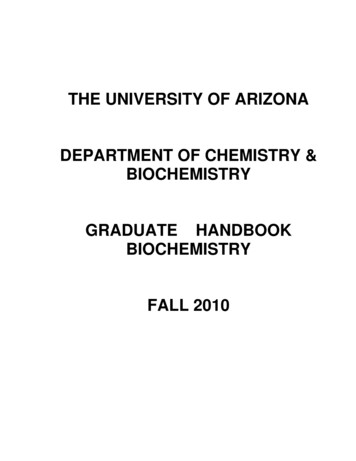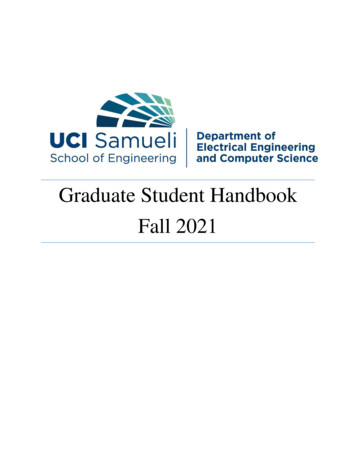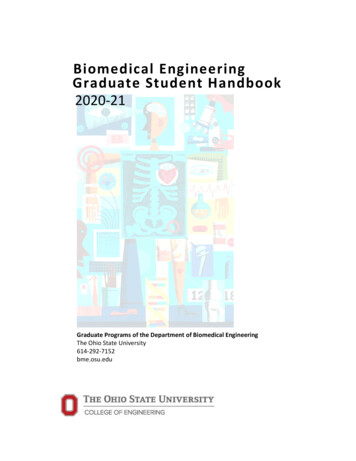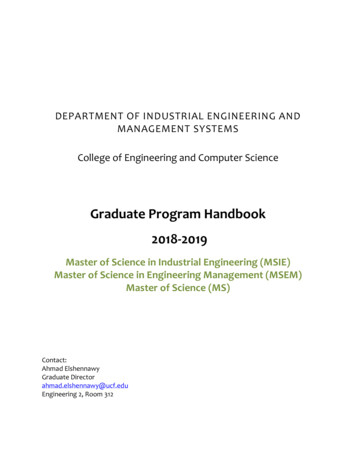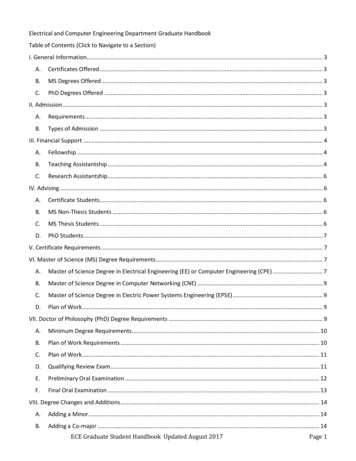
Transcription
Graduate Student Handbookfor the following programs:Master of EngineeringMaster of Science Engineering/Engineering Scienceconcentration in Software EngineeringGlobal Outreach and Extended EducationIra A. Fulton Schools of EngineeringArizona State University
2MANUAL OF THE MASTERS DEGREES IN:MASTER OF SCIENCE ENGINEERING (MSE)MASTER OF ENGINEERING (MEng)ARIZONA STATE UNIVERSITY2019-2020MSE and MEng graduate degrees please contact:Global Outreach and Extended EducationIra A. Fulton School of EngineeringArizona State UniversityTempe, AZ 85287-8809PHONE: (480) 965-0637MSE/ES & MEng on the web: mail address: student-fseonline@asu.eduRevised updated June 2019
3CONTENTSTable of ContentsINTRODUCTION . 5Purpose of the Handbook .5Overview of Online Delivery .5Proctoring Service.5Areas of Study for Master of Engineering .5Master of Science in Engineering – Engineering Science-concentration Software Engineering .6General Information .6New Students .6Student Responsibility .6Faculty Responsibility .7THE GRADUATE PROGRAMS WITHIN GLOBAL OUTREACH AND EXTENDEDEDUCATION . 7Administration .7Graduate Degree Programs .7Engineering Vision and Mission .7ADMISSIONS . 7Eligibility .7Application.8Non-degree Students .9Assigned Faculty Advisor .9PLAN OF STUDY . 9Course Plan Outline .9Master of Engineering area of study Engineering Management . 9Master of Engineering area of study Quality, Reliability, and Statistical Engineering: . 11Master of Engineering area of study Systems Engineering: . 11Master of Science Engineering/Engineering Science concentration Software Engineering . 13Culminating Experience . 13Master of Engineering. 13Master of Science Engineering/Engineering Science concentration Software Engineering . 14ACADEMIC REQUIREMENTS AND POLICIES. 14It is the responsibility of each student to understand and observe all policies and requirementsspecified by the Graduate College and the Ira A. Fulton Schools of Engineering. Connect withyour academic advisor to review any policy and the impact of any decision to be made by thestudent on their program. . 15Academic Integrity. 15Revised updated June 2019
4Continuous Enrollment Policies . 15Grades . 16Leave of Absence Policies . 16Time Limit . 16Academic Status: Satisfactory and Probation . 17Academic Calendar . 18FINANCIAL INFORMATION . 18Program Tuition . 18Financial Aid. 18Scholarships . 18Contact Information . 19Revised updated June 2019
5INTRODUCTIONPurpose of the HandbookThis Handbook serves as a guide for graduate students admitted to Master of Engineeringand Master of Science Engineering/ Engineering Science programs administered by theOffice of Global Outreach and Extended Education. This handbook serves as an initialresource for answers to common questions; however, students are also encouraged toconsult with the graduate advisor and the faculty committee chair. The primary referencefor graduate students on rules and regulations is the Arizona State University (ASU)Academic Catalog. Each student should become familiar with the Academic Catalog andthe ASU Graduate College website and policies. Please note that policies and proceduresare occasionally amended to improve the program.Overview of Online DeliveryThe MEng and MSE programs are available completely online for students to accessfrom any location. Classes are developed specifically for online students to create acomprehensive and engaging experience that mirrors the curriculum, outcomes, and rigorof Fulton’s campus based programs. Course material is delivered through various meansincluding interactive content, lectures, multi-media, and text. Opportunities forinteraction with faculty and collaboration with peers are also embedded throughout thecourses through both synchronous and asynchronous means. The Office of GlobalOutreach and Extended Education (GOEE) administers the digital immersion programs.Proctoring ServiceRPNow is an on-demand service for proctoring online exams in an LMS (LearningManagement System) such as Canvas. Here is a site with some background information ifyou are interested w ProcessFaculty identify when they will be holding exams during the semester.Faculty work with GOEE to set up a practice exam within their course well in advance ofthe first exam. This gives students the opportunity to practice using the system in a lowstakes environment and gives faculty the opportunity to ask questions of GOEE before anactual exam. GOEE creates the exam within RPNow and notifies the faculty.Exam is launched and students complete the exam.Flagged student violation recordings are reviewed for academic integrity concerns.Faculty are able to grade and return the exams electronically.Areas of Study for Master of EngineeringThe Master of Engineering degree program at Arizona State University (administered bythe Office of Global Outreach and Extended Education, GOEE) offers opportunities forstudy beyond the bachelor’s degree in three areas of study: Engineering Management,Quality & Reliability Engineering, and Systems Engineering. These programs areRevised updated June 2019
6designed for working professionals and delivered entirely online to meet the unique needsof professional engineers.Master of Science in Engineering – Engineering Science-concentration SoftwareEngineeringThe Master of Science in Engineering in engineering science at Arizona State University(administered by the Office of Global Outreach and Extended Education, GOEE) offersopportunities for study beyond the bachelor’s degree in the concentration of SoftwareEngineering. This program is designed for working professionals and delivered entirelyonline to meet the unique needs of professional engineers.General InformationGeneral information, including admission, residency, and degree requirements of theGraduate College is contained in the latest ASU Graduate Catalog. (The Catalog isavailable on the Web at http://catalog.asu.edu) The Graduate College generalrequirements apply in their entirety to graduate programs in Master of Engineering andMaster of Science in Engineering. This document contains additional and more specificrequirements of the graduate programs administered by GOEE.New StudentsAll new students will receive an email from the Office of Global Outreach and ExtendedEducation (cpd.hwexam@asu.edu) after a recommendation for admission has been madeto the Graduate College. This email serves to inform the incoming student aboutimportant Arizona State University notifications they should anticipate to receive regardtheir admittance. It will also include the assignment and contact information for theassigned faculty advisor, contact information for the graduate advisor, important links toview the Graduate Handbook, and information about building the interactive Plan ofStudy (iPOS).Student ResponsibilityIt is the responsibility of each student to understand and observe all procedures andrequirements specified by the Graduate College and the faculty in the engineeringprograms. The faculty and graduate advisor provide academic advice and assistance;however, the ultimate responsibility for meeting degree requirements remains with thestudent. Important websites regarding student responsibilities may be found via: The Graduate College – http://graduate.asu.edu The Student Code of Conduct - https://eoss.asu.edu/dos/srr/codeofconduct Academic Integrity - https://provost.asu.edu/academic-integrity Graduate Education Policies and Procedures u-graduate-policies-andprocedures 032019 0.pdf Global Outreach and Extended Education Student Manual es/goee-student-manual.pdfRevised updated June 2019
7 The Ira A. Fulton School of Engineering – http://engineering.asu.eduFaculty ResponsibilityThe members of the faculty that instruct for the Master of Engineering and Master ofScience Engineering/ Engineering Science programs have diverse backgrounds andknowledge. They are available to assist you in your plan of study and your educationaland career goals. We encourage you to take the opportunity to reach out to your facultywith any questions regarding course content and/or industry related questions.THE GRADUATE PROGRAMS WITHIN GLOBAL OUTREACHAND EXTENDED EDUCATIONAdministrationThe Office of Global Outreach and Extended Education administers the Master ofEngineering and the Master of Science in Engineering – Engineering Science withconcentration in Software Engineering, in accordance with policies of the GraduateCollege, the Ira A. Fulton Schools of Engineering, and the departmental faculty. Inaddition, the Academic Director serves as the focal point for graduate students andgraduate programs within the department.Graduate Degree ProgramsThe online engineering programs offer courses leading to the degrees of Master ofScience (MS), Master of Science in Engineering (MSE), and Master of Engineering(MEng). The MEng is a graduate degree intended to meet the needs of Arizona’spracticing engineers and is designed primarily for Online students.General requirements for these degrees are stated in the current Graduate Catalog.Engineering Vision and MissionVision: Leading Engineering Discovery and Innovative Education for Global Impact onQuality of Life.Mission: Provide an Environment Rich in Transdisciplinary Research, Education,Entrepreneurship, and Leadership Resulting in Successful Engineers and Technologiesthat Benefit Society.ADMISSIONSEligibilityThe Master of Engineering degree requires Bachelor of Science in engineering, science,or math and have taken a calculus sequence (Calculus 1 and 2, required) while pursuingRevised updated June 2019
8their B.S. and have completed an undergraduate calculus-based probability and statisticscourse (required). However, in some cases, students with nontraditional educationalbackgrounds will be considered for admission. These students may be required to takefundamental courses to better prepare them for the program coursework.The Master of Science Engineering/ Engineering Science concentration SoftwareEngineering degree requires that applicants must provide evidence of demonstratedexpertise in the area of object-oriented programming, advanced data structures, algorithmdesign and algorithm analysis; maturity in high-level programming (required); andsuccessful completion of Calculus I (a minimum requirement) to be considered foradmission.ApplicationApplications are accepted for fall, spring, and summer terms for these programs. In orderfor applications to be properly processed all students are required to submit thefollowing: an application, all required supporting materials listed below with the Officeof Graduate Admission, and pay the required fee. Incomplete applications will not beconsidered.List of required supporting materials.1. Official transcripts from all universities attended2. Statement of Purpose3. Current Resume4. English Proficiency- required for all international applicants from a countrywhose native language is not EnglishEnglish Proficiency- Required for all international applicants from a country whosenative language is not English to provide the Test of English as a Foreign Languages(TOEFL) or the International English Language Testing System (IELTS) scores.Applications will not be processed until the university receives official EnglishProficiency scores, and are valid two years from the start date of the degree program. TheASU Institution code is 4007. If department code is required use 99 for TOEFL.International applicants can also meet the English Proficiency requirements throughASU Global Launch’s online English for Admission courses.Transcripts should be mailed to:If sending by stamped mail:Admission Services Applicant ProcessingArizona State UniversityPO Box 871004Tempe AZ 85287-1004If sending by FedEx, DHL or UPS:Arizona State UniversityAdmission Services Applicant Processing1150 East University Drive Building C, Room 226Revised updated June 2019
9Tempe, AZ 85281Non-degree StudentsNon-degree students will not be allowed to register for online engineering courseswithout special permission. To enroll in graduate-level online courses as a non-degreestudent, the applicant must meet the requirements for regular admission to the graduateprogram.Assigned Faculty AdvisorBefore beginning coursework for a graduate program, admitted students will be assigneda faculty advisor within the discipline of their program. Faculty advisors are tenuredprofessors and experts in their centralized area within Engineering. Faculty advisors canhelp students in their selection of elective courses, research topics, and approval of theprogram of study.PLAN OF STUDYBefore completing the first nine credits of graduate course work, each student mustsubmit a plan of study (iPOS), which must be approved by the student’s faculty advisor,the Academic Director and the Graduate College. The plan of study will list all coursesthat are to be completed as part of the student’s degree program as well as a schedule forcompletion of any undergraduate or graduate deficiencies. The plan of study may beamended as the student progresses through the program with the approval of the student’sfaculty advisor and the Graduate Program Chair. The plan of study should be designedusing the designated Course Plan Outlines listed below.Course Plan OutlineMaster of Engineering area of study Engineering ManagementCore Courses:Select three (3) of the following Industrial Engineering Methods Courses: IEE505 Information Systems Engineering* IEE506 Web Enabled Decision Support Systems* IEE520 Statistical Learning for Data Mining IEE545 Simulating Stochastic Systems IEE572 Design of Experiments (math course meeting MEng requirements) IEE574 Applied Deterministic Operations Research IEE575 Applied Stochastic Operations Research ModelsSelect four (4) of the following Engineering Management Core Courses: IEE512 Financial Engineering IEE530 Enterprise ModelingRevised updated June 2019
10 IEE541 Engineering AdministrationIEE552 Strategic Technology ManagementIEE454 Risk Management***IEE556 Introduction to Systems EngineeringIEE458 Project Management***IEE571 Quality ManagementIEE 581 Six Sigma Methodology**Elective Courses:Select two (2) electives from one area. Below are examples of possible electives.Innovation and Entrepreneurship: FSE501 Technology Entrepreneurship FSE502 Strategic Enterprise InnovationSoftware: CSE566 Software Project, Process and Quality Management CSE565 Software Verification, Validation, and TestingSupply Chain: IEE534 Supply Chain Modeling and Analysis IEE561 Production SystemsQuality and Reliability: IEE570 Advanced Quality Control** IEE573 Reliability Engineering IEE578 Regression Analysis IEE 512 may be used as an Industrial Engineering Methods course if the option tocomplete another IEM course is not available to the student.*Students may select IEE 505 OR IEE 506. Students may not complete both as they areconsidered duplicative.**required courses must be selected for students pursuing the Lean Six Sigma Black BeltGraduate Certificate.***must request override to enrollCapstone:Select one (1) capstone experience: IEE593 Engineering Management Applied Project (offered Fall and Spring only) IEE585 Six Sigma Capstone Project (only permissible for students admitted intothe concurrent Lean Six Sigma Black Belt Graduate Certificate)Revised updated June 2019
11Master of Engineering area of study Quality, Reliability, and Statistical Engineering:Core Courses: IEE 572 Design of Engineering Experiments IEE 578 Regression Analysis IEE 570 Advanced Quality Control* IEE 573 Reliability Engineering IEE 571 Quality ManagementElective Courses:(Select four (4) electives) IEE 520 Data Mining IEE 579 Time Series and Forecasting IEE 581 Six Sigma Methodology* IEE 561 Production Systems IEE 582 Response Surfaces and Process Optimization IEE 512 Introduction to Financial Engineering IEE 552 Strategic Technological Planning IEE 545 Simulating Stochastic Systems IEE 574 Applied Deterministic Operations Research Models IEE 575 Applied Stochastic Operations Research Models IEE 534 Supply Chain Modeling and Analysis*required course must be selected for students pursuing the Lean Six Sigma Black BeltGraduate Certificate.Capstone:Select one (1) capstone experience: IEE593 Engineering Management Applied Project (offered Fall and Spring only) IEE585 Six Sigma Capstone Project (only permissible for students admitted intothe concurrent Lean Six Sigma Black Belt Graduate Certificate)Master of Engineering area of study Systems Engineering:Core Courses:Select one (1) Engineering Management Course: IEE 454 Risk Management** IEE 458 Project Management** IEE 541 Engineering Administration IEE 552 Strategic Technologic Planning FSE 501 Technology Entrepreneurship FSE 502 Strategic Enterprise InnovationSelect (five) of the following Systems Core Courses:Revised updated June 2019
12 IEE 505 Information Systems Engineering*IEE 506 Web Enabled Decision Support Systems*IEE 512 Financial EngineeringIEE 530 Enterprise ModelingIEE 545 Simulating Stochastic SystemsIEE 570 Advanced Quality ControlIEE 572 Design of ExperimentsIEE 573 Reliability EngineeringIEE 574 Applied Deterministic Operations Research*Students may select IEE 505 OR IEE 506. Students may not complete both as they areconsidered duplicative.**must request override to enrollConcentration Course: IEE 556 Introduction to Systems EngineeringElective Courses:Select two (2) electives from one area. Below are examples of possible electives.Software: CSE 565 Software Verification and Validation CSE 566 Software Project, Process and Quality ManagementHardware: EEE 586 Nonlinear Control Systems EEE 587 Optimal Control SystemsInnovation and Entrepreneurship: (students may not take IEE 552 if selecting this electivearea as they are considered duplicative to the courses below) FSE501 Technology Entrepreneurship FSE502 Strategic Enterprise InnovationSupply Chain: IEE534 Supply Chain Modeling and Analysis IEE561 Production SystemsQuality and Reliability IEE570 Advanced Quality Control** IEE581 Six Sigma Methodology****required courses must be selected for students pursuing the Lean Six Sigma Black BeltGraduate Certificate.Capstone:Select one (1) capstone experience:Revised updated June 2019
13 IEE593 Engineering Management Applied Project (offered Fall and Spring only)IEE585 Six Sigma Capstone Project (only permissible for students admitted intothe concurrent Lean Six Sigma Black Belt Graduate Certificate)Master of Science Engineering/Engineering Science concentration Software EngineeringCore Courses: CSE 565: Software Verification and Validation CSE 566: Software Project, Process and Quality ManagementConcentration Course: CSE 591 Software Engineering Principles and ConceptsElective Courses: 18-21 credit hoursSelect 18-21 elective credits. At least 6 credits in CSE. Examples are listed below: CSE 564: Software Design CSE 598: Software Analysis and Design CSE 598: Distributed Software Development CSE 561: Modeling & Simulation Theory and Application CSE 598: Software Integration and Engineering CSE 598: Web Usability: Principles and Techniques EEE 511: Artificial Neural Computation EEE 553: Coding and Cryptography FSE 501: Technology Entrepreneurship IEE 556: Introduction to Systems Engineering IEE 572: Design of Experiments IEE 598: Design for Six SigmaCapstone:All students admitted to the M.S.E. program in engineering science with a concentrationin software engineering must complete a culminating experience. The culminatingexperience can be fulfilled with one of the following: CSE 593: Applied Project (offered Fall and Spring only) Applied Portfolio. See Culminating Experience as listed below.Culminating ExperienceMaster of EngineeringAll students admitted to the Master of Engineering must complete an applied project toserve as the culminating experience for their graduate study. A grade of “B” or better isrequired in your Applied Project.Applied ProjectRevised updated June 2019
14Students will enroll in their corresponding Applied Project course for their program(IEE593) and work their faculty advisor to complete a self-identified project (ex: researchproposal, development project). Department override must be obtained before enrollingin this course. A grade of “B” or better is required in your Applied Project.Master of Science Engineering/Engineering Science concentration Software EngineeringAll students admitted to the M.S.E. program in engineering science with a concentrationin software engineering must complete an applied project or a portfolio to serve as theculminating experience for their graduate study.Applied ProjectStudents will enroll in CSE593: Applied Project and work with a faculty member tocomplete a self-identified project (ex: research proposal, development project).Department override must be obtained before enrolling in this course. A grade of “B” orbetter is required in your Applied Project.PortfolioThe portfolio entails a written summary of the student’s learning supported by oneproject from each of three engineering 500 level courses in which a final grade of a B orbetter was earned in each course and final approval by the student’s faculty advisor andthe graduate program academic director.A written summary of your learning outcomes of your program of study in typewrittenformat approximately 1-2 pages. This reflection should include what you have learnedwith relation to the three supporting projects. The three referenced projects must besubmitted with the Master’s Portfolio Submission Cover Sheet to the GOEE office.Students should submit their portfolio prior to their last semester to allow sufficient timefor review and approval.After approval by the faculty advisor and the graduate program academic director, theGOEE graduate advisor will notify the Graduate College of satisfactory completion of theProject Portfolio. Once the portfolio is approved and processed, students will see theculminating experience satisfied through MyASU – iPOS tab.ACADEMIC REQUIREMENTS AND POLICIESRevised updated June 2019
15It is the responsibility of each student to understand and observe all policies and requirementsspecified by the Graduate College and the Ira A. Fulton Schools of Engineering. Connect withyour academic advisor to review any policy and the impact of any decision to be made by thestudent on their program.Academic IntegrityStudents have the responsibility to understand and uphold the highest standards ofacademic integrity. Newly admitted graduate students will receive a "priority task" ontheir MyASU directing them to complete module on academic integrity. The moduleconsists of a PowerPoint that outlines academic integrity and students must take a quizand pass with an 80% or higher.The failure of any graduate student to meet these standards may result in seriousconsequences including suspension or expulsion from the university and/or othersanctions as specified in the academic integrity policies of individual colleges as well asthe university. Violations of academic integrity include, but are not limited to: cheating,fabrication, tampering, plagiarism, or aiding and/or facilitating such activities. At thegraduate level, it is expected that students are familiar with these issues and each studentmust take personal responsibility in their work. In addition, graduate students areexpected to follow university guidelines related to the Student Code of Conduct.University policies related to academic integrity and code of conduct are available athttp://students.asu.edu/srr/code.Continuous Enrollment PoliciesOnce admitted to a graduate degree program, students must be registered for a minimumof one credit hour during all phases of their graduate education, including the term inwhich they graduate. This includes periods when students are engaged in research,working on or defending theses, or in any other way utilizing university resources,facilities, or faculty time. Registration for every fall semester and spring semester isrequired. Summer registration is required for students taking examinations, completingculminating experiences, defending theses, or graduating from the degree program.To maintain continuous enrollment the credit hour(s) must: Appear on the student’s Plan of Study, ORContinuing registration (595, 795), ORBe a graduate-level courseGrades of “W” and/or “X” are not considered valid registration for continuous enrollmentpurposes. “W” grades are received when students officially withdraw from a course afterthe add/drop period. “X” grades are received for audit coursesRevised updated June 2019
16GradesAcademic excellence is expected of graduate students. A student who has been admittedto a graduate degree program in Engineering, either on a regular or provisional admissionstatus, must maintain a 3.0 or higher grade point average (GPA) in:1. All work taken for graduate credit (courses numbered 500 or higher),2. The coursework in the student’s approved plan of study, and3. All course work taken at ASU (overall GPA) post baccalaureate.A student will be placed on academic probation if one or more of the student's GPAslisted above falls below 3.0. Students will be notified by mail when placed on academicprobation.Incomplete GradesAdditionally, students completing work for a course in which they received a grade of“I” must maintain continuous enrollment as defined previously. Graduate students haveone year to complete work for an incomplete grade; if the work is not completed
graduate programs within the department. Graduate Degree Programs The online engineering programs offer courses leading to the degrees of Master of Science (MS), Master of Science in Engineering (MSE), and Master of Engineering (MEng). The MEng is a graduate degree intended to meet the needs of Arizona's practicing engineers and is designed .
